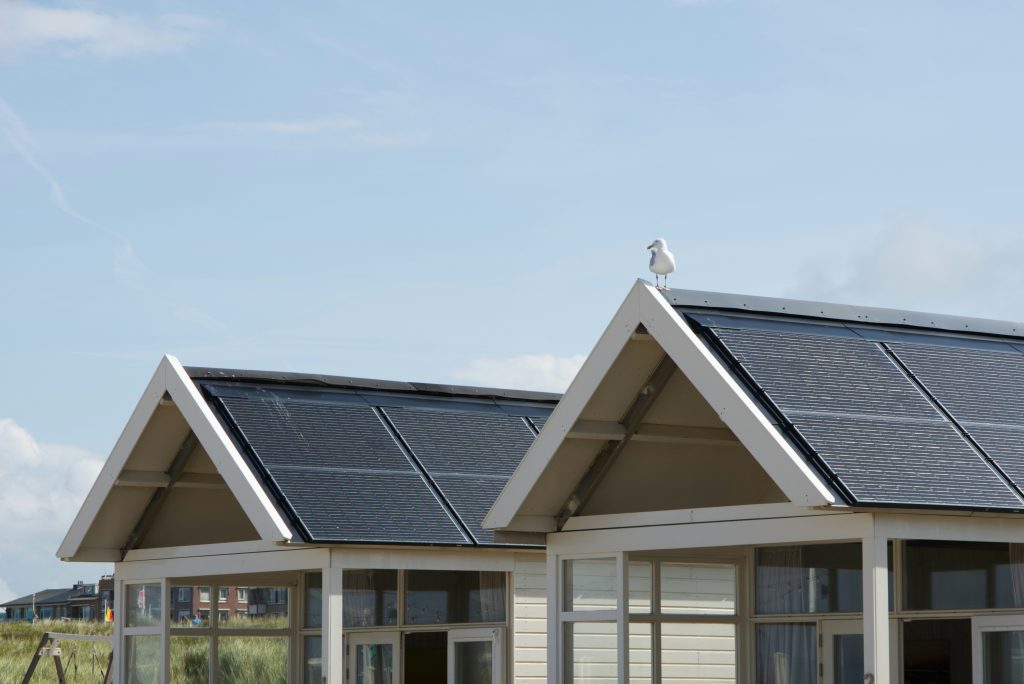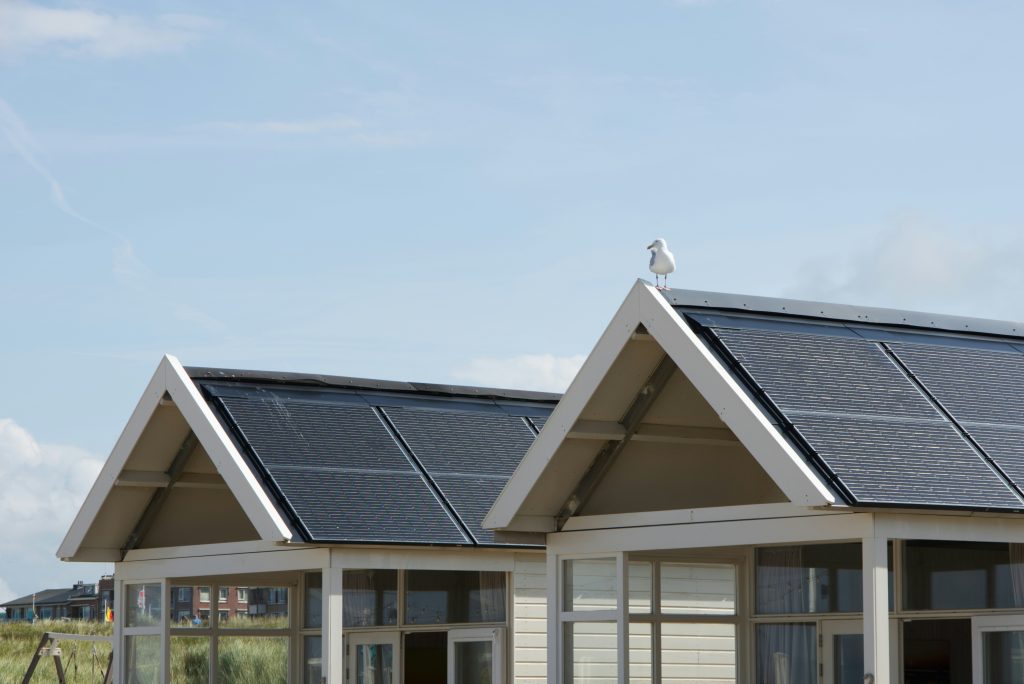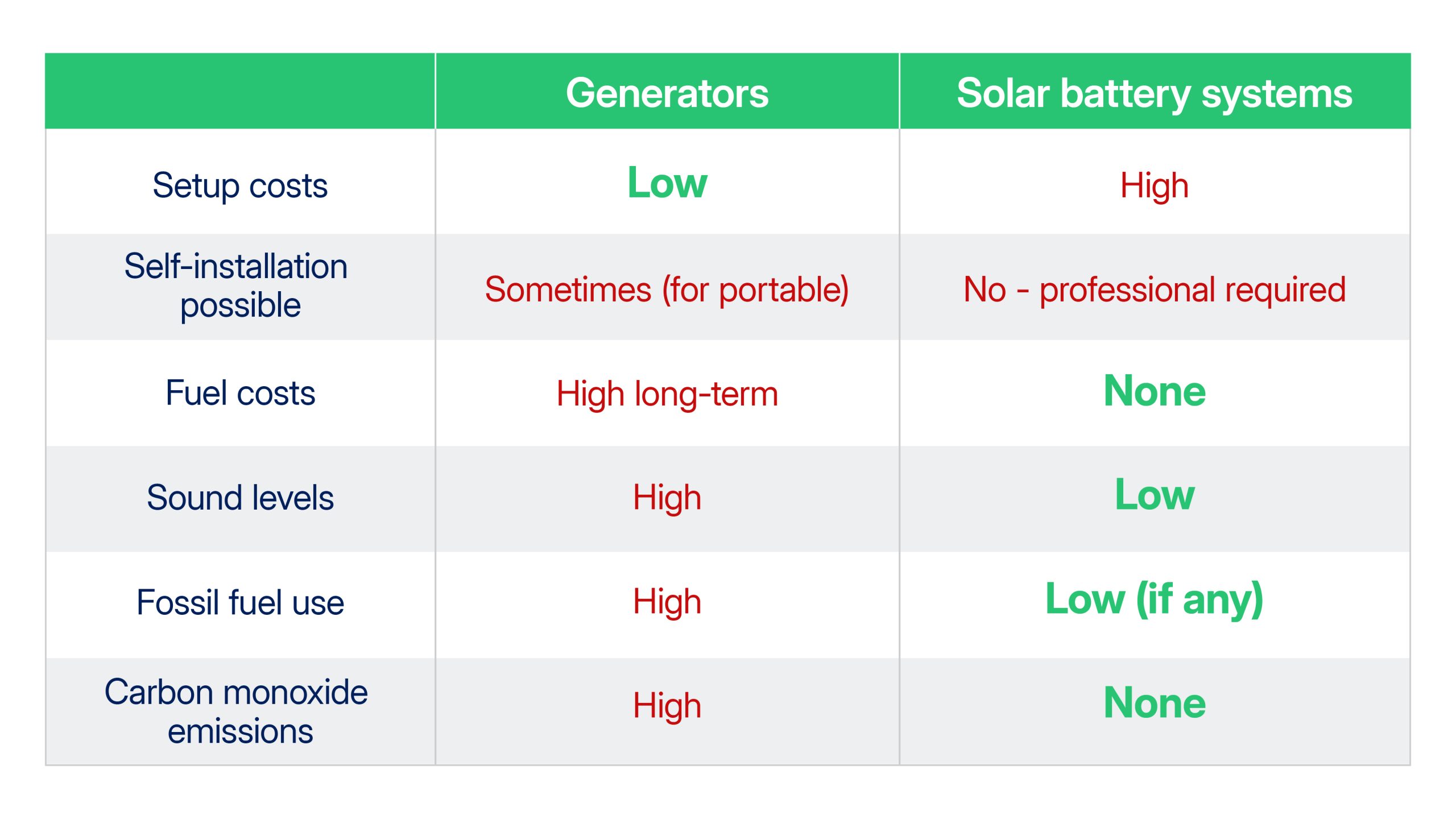Batteries vs generators: Choosing the right one for your home power backup
From costs to carbon emissions, we look at the key differences between solar battery systems and generators that homeowners need to consider.

Key takeaways
- Battery systems offer a cleaner, quieter, more sustainable backup power option.
- Generators are generally more cost-effective upfront but require ongoing fuel expenses, which can become a financial burden over time.
- Batteries provide long-term savings by reducing energy costs and integrating seamlessly with renewable energy solutions.
- There are many critical factors to consider when choosing between generators and battery systems, such as your home’s energy needs, installation, maintenance, and environmental impact.
What are your options for home power backup?
Nothing disrupts your daily routine faster and more frustratingly than a power outage. That’s why many homeowners choose to install a reliable power backup system for continuity and comfort. Protecting against any outages and surges, these backup solutions ensure you’re always powered up, and never left in the dark.
Typically, homeowners have two main options for backup power – batteries and generators. Each has its own unique features, advantages, and limitations when it comes to specific homeowner needs. Let’s take a look at each option in more detail.
Battery systems
A solar battery system works by using energy storage inverters to store excess energy produced by your solar panels (or grid power) during the day for later use. This stored energy can then be used when solar energy production is low – such as at night, on cloudy days, or during power outages.
Over the years, these photovoltaic (PV) battery systems have become increasingly popular with homeowners because of their efficiency, quiet operation, and ability to integrate seamlessly with renewable energy sources.
In particular, there are two types of solar battery systems that are most commonly used by homeowners:
- Stackable batteries – stackable battery systems, like those found in the Hoymiles low-voltage range, help homeowners increase their energy storage capacity incrementally. Because of their modular plug-and-play design, they are easy to install to help you get up and running in no time.
- Detached batteries– detached batteries, such as the new Hoymiles LB-5D-G2 model, provide a more flexible installation, separate from the main solar inverter. These systems are more versatile and support higher storage capacities, which makes them well-suited to efficiently accommodate varying power needs.

LB-5D-G2
Available in APAC
LB-5S/10S/15S/20S-G2
Available in EuropeNo matter which solar battery backup system you opt for, there are many additional benefits to homeowners, including:
- Virtually silent operation – unlike generators, batteries run without noise, making them ideal for residential areas.
- Day-to-day usability – unlike generators, which are only needed during outages, battery systems can be used daily to store solar energy and reduce utility bills.
- Clean energy – batteries pair well with solar systems, reducing your dependency on fossil fuels to support a fully green energy solution.
- Minimal maintenance – once installed, solar battery systems require little upkeep – a major plus for an already busy household.
- Long-term savings – while batteries may have a higher initial cost, they eliminate fuel expenses and cut household energy costs, making them more cost-effective in the long run.
Generators
Generators are traditional backup power sources that run on fuel such as gasoline, propane, or diesel. They provide immediate power when the grid goes down, and are available in portable and standby models.
Unlike batteries, generators work by converting mechanical energy into electrical energy through an internal combustion engine. When there is a power outage, a generator can start automatically (in standby models) or manually (in portable ones) to supply electricity to your home.
There are some benefits to using generators, including:
- Flexible fuel options – as generators can run on multiple different fuel types, this offers flexibility during emergencies. For instance, gasoline and diesel models are the most widely available, while propane options provide a cleaner-burning option for homeowners.
- High power output – generators can handle heavy energy loads, which makes them more suitable for larger households or during extended outages.
- Immediate availability– generators can provide on-demand power straight away (as long as it has a sufficient fuel supply).
However, using generators also comes with drawbacks, such as their high noise levels, fuel costs and emissions, and more hands-on maintenance requirements compared to batteries. They are also only limited to use during extended power outages, instead of day-to-day use like battery systems.

Batteries and generators compared: Which one works best?
There are many factors at play when it comes to choosing the perfect power backup solution for your home.
One of the key considerations is cost. For example, batteries may have a higher upfront cost compared to generators, but ensure a better ROI for households by reducing energy expenses over time and end up paying for themselves. Meanwhile, the long-term operating costs of generators are significantly higher due to fuel expenses and ongoing maintenance.
However, there are more questions to answer before making your final decision.
Ask yourself:
- What are my energy needs?
- Do I want to install my home power backup system myself, or get a professional to do it for me?
- How often do I want to maintain my home power backup (if at all)?
- Do I want to prioritize more eco-friendly home power solutions?
To help you decide which one would suit your needs best, let’s dive into each comparison more closely.
Energy needs
Your biggest concern when choosing a backup power solution should be your home’s energy requirements. The amount of energy your home consumes can vary enormously – the size of your home, the number of appliances you use, and the duration of outages in your area all play a large role in your decision.
Battery systems
Batteries are perfect for moderate energy needs, such as powering essential appliances day-to-day. As battery systems are so adaptable to different scenarios, they can be used more frequently, such as at night or during outages. For example, depending on the battery system’s capacity, it can support lighting, refrigerators and freezer units, and communication devices for anything from several hours up to a full day. This makes batteries the most cost-effective solution for general households. Not only do they cut energy costs and save utility bills in the long term, they are also more economically feasible than generators.
Generators
Generators are more suited to high energy demands, including HVAC systems, water heaters, and large appliances during longer outages. This makes them well-suited to regions with extreme weather conditions, where outages can last for several days or even longer.
Standby generators with larger fuel tanks, for example, can provide continuous power for as long as there is a fuel supply.
However, while generators are only needed during long-time outages – which are rare in most places – they rely on a constant source of expensive fuel, a significant ongoing expense for many households.
Installation
When it comes to installing either generators or solar battery systems, there’s a lot to consider – whether it’s the complexity or the costs. Let’s take a look at each.
Battery systems
Typically, installing a battery system requires a professional to safely and efficiently add to your home’s electrical panel and solar panel system. Battery systems often don’t require much space, as their compact designs can either be mounted on walls or placed in discrete locations. Some detached battery systems like the Hoymiles LB-5D-G2 offer even more flexibility, as they don’t need to be installed directly alongside the inverter.
Generators
Portable generators are relatively easy to set up, as they only require a safe outdoor space and proper connections.
However, standby generators need professional installation, including electrical wiring and potentially plumbing (for a natural gas connection). This means that the space requirements are significantly larger for most standby generators.
In addition, there may be local regulations in place that dictate where you can place your generator to ensure safety and noise compliance.
Maintenance
How much time can you dedicate to maintaining your backup power solution? While both batteries and generators need some level of care, the extent of maintenance differs drastically.
Battery systems
Modern solar battery systems are designed for low maintenance. Common in solar setups, they typically have a long lifespan and require much less intervention compared to traditional lead-acid batteries.
Every Hoymiles battery system comes with monitoring software that allows homeowners to track performance and receive alerts for any issues. This means that you only ever need to perform routine checks to ensure connections are secure and the system is free from dust.
Generators
Generators require much more maintenance than battery systems – from frequent oil changes and air filter replacements to regular inspections for wear and tear. They also require regular removal of any stale fuel – which could lead to performance issues – as well as refilling and thorough inspections of propane or diesel tanks.
Standby generators also often come with maintenance contracts to make sure they continue to work efficiently. All of this adds to the overall cost of generator ownership.
Environmental impact
Environmental awareness is growing all the time, and many homeowners today prioritize more eco-friendly solutions.
Battery systems
When paired with renewable energy sources like PV panels, battery systems are the more sustainable choice as part of a complete green energy system for your home.
Not only do they contribute to reducing carbon emissions by storing clean energy for later use, batteries also produce no noise – ideal for residential neighborhoods with strict noise regulations.
Generators
Generators rely on fossil fuels, contributing to both greenhouse gas emissions and air pollution. Depending on the type of fuel they use, even the most modern generators have a much larger carbon footprint than battery systems – diesel being the most polluting, and propane being the least.
Noise pollution is also a concern, especially in portable generators, which can reach anywhere between 60 to 90 decibels.
Choosing the right solution for your home
As a homeowner, deciding between batteries and generators ultimately depends on your needs. Solar power with battery backup is an excellent choice for eco-conscious homeowners who need quiet, low-maintenance solutions. On the other hand, generators are a dependable option for households with high energy demands or often experience lengthy outages. Advanced options like Hoymiles low-voltage battery systems provide flexibility and scalability to suit your residential energy needs – discover the full range today.
Subscribe to our newsletter andget the latest news!
